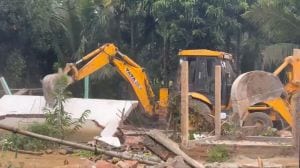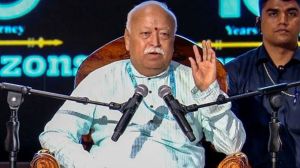Calling for new J&K deal,interlocutors invoke the old
The CCs recommendations must be reached through consensus,the report says,so that these are acceptable to all stake holders represented in the Assembly and Parliament.
Seeking a new compact for Jammu and Kashmir,the Centres three interlocutors have drawn a roadmap to resolve the Kashmir dispute without acknowledging that it has been the demand for a solution outside the ambit of the Constitution that has fueled the insurgency since 1990.
And in what is expected to provoke reaction from both mainstream political parties and separatists,the interlocutors,in their 176-page report,have seen the Kashmir problem largely through the prism of Centre-state relations.
Indeed,the interlocutors,Dileep Padgaonkar,Radha Kumar and M M Ansari,have concluded that at the heart of all the dirges they use this term to describe the demand for Azadi,(demand for) an Islamic State, autonomy,self-rule,achievable nationhood and other such alternatives is the sentiment that the woes of Kashmir are due to the emasculation of the substance of its distinctive status enshrined in Article 370 of the Constitution of India.
Underlining that the clock cannot be set back,the interlocutors have upheld Article 370 and recommended the setting up of a Constitutional Committee (CC) to review all Acts and Articles of the Constitution of India extended to J&K after the 1952 Delhi agreement.
Although the interlocutors talk about the growing political,communal and regional wedges across J&K,the report suggests that they found areas of general consensus: on the need for dialogue to settle the issue,J-K as a single entity within the Indian Union,the need to uphold the states distinctive status guaranteed by Article 370 and addressing the diverse aspirations of the three regions Jammu,Kashmir and Ladakh.
The reports recommendations that fall far short of what has been demanded by the National Conference and the Opposition Peoples Democratic Party are mainly focused on the well-worn themes of the Centre-State relationship,devolution of powers and governance.
Ironically,the interlocutors define freedom demanded by the people in the state as freedom from a staggering range of afflictions: freedom from religious extremism and opaque and unaccountable administration; from economic structures to social structures and policies; freedom from harsh laws,or laws harshly applied to intimidation and violence that compel people to flee their habitat.
Admitting that a political settlement in Jammu and Kashmir must be achieved only through dialogue between all stakeholders,including those who are not part of the mainstream, the report says that the solution has to be found while J&K continues to function as a single entity within the Indian Union.
The interlocutors admit that a major gap in our mission was our failure to open a dialogue with the APHCs (All Party Hurriyat Conference),JKLF and associated groups (separatists).
The CCs recommendations must be reached through consensus,the report says,so that these are acceptable to all stake holders represented in the Assembly and Parliament. The next step would be for the President under Article 370 to issue an order incorporating these recommendations of the CC. The order will need to be ratified by a Bill in both Houses of Parliament and by each House in the state legislature by a special two-thirds majority to be presented to the President for assent.
The report also listed several recommendations to harmonise relations between people on both the sides of Line of Control including a consultative mechanism where elected representatives from both sides can discuss water,economy,tourism and trade. This would be especially effective if democratic institutions of self-governance are established in areas of princely state under the de-facto control of Pakistan,the report says. The core idea here is to make the LoC irrelevant,a mere line on a map, it said.
KEY PROPOSALS
Constitutional Committee to review all Central Acts and Articles extended to the State,headed by an eminent personality who enjoys the esteem of the people of J&K and of the people of India. Its conclusions will be reached within six months and the President will issue an order once the state Assembly ratifies,will be binding on all of them.
Delete the word temporary from Article 370 of the Constitution and replace it with Special as it has been used for other states under article 371.
On the Governor,state government,after consultations with Opposition parties,shall submit a list of three names to President.
Create three Regional Councils,one each for Jammu,Kashmir and Ladakh. Devolve certain legislative,executive and financial powers to them.
Parliament will make no laws applicable to the state unless it relates to the countrys internal and external security and its vital economic interests.



- 01
- 02
- 03
- 04
- 05




























